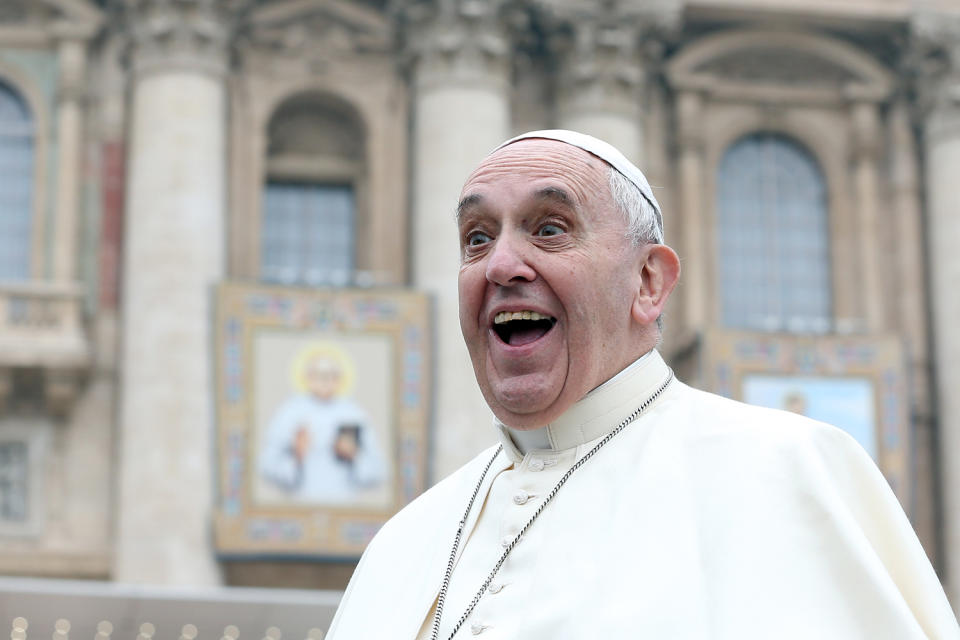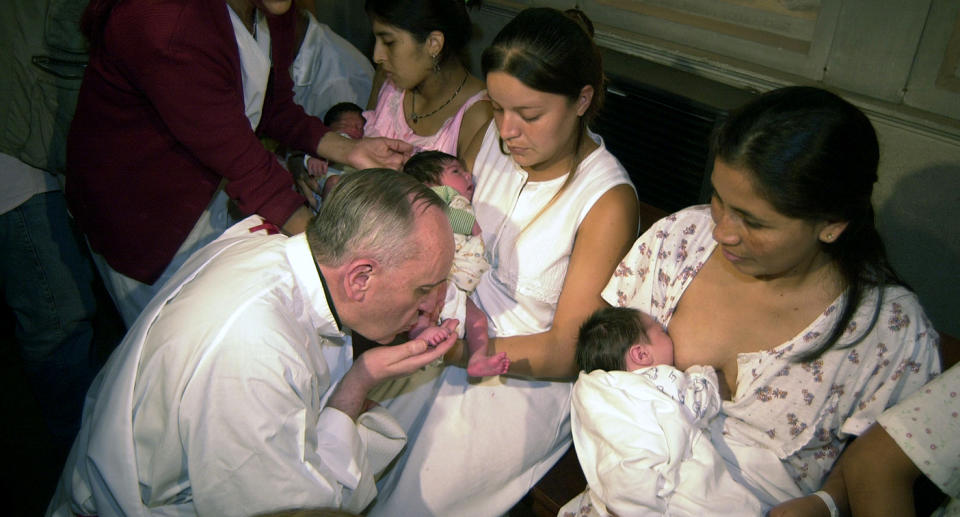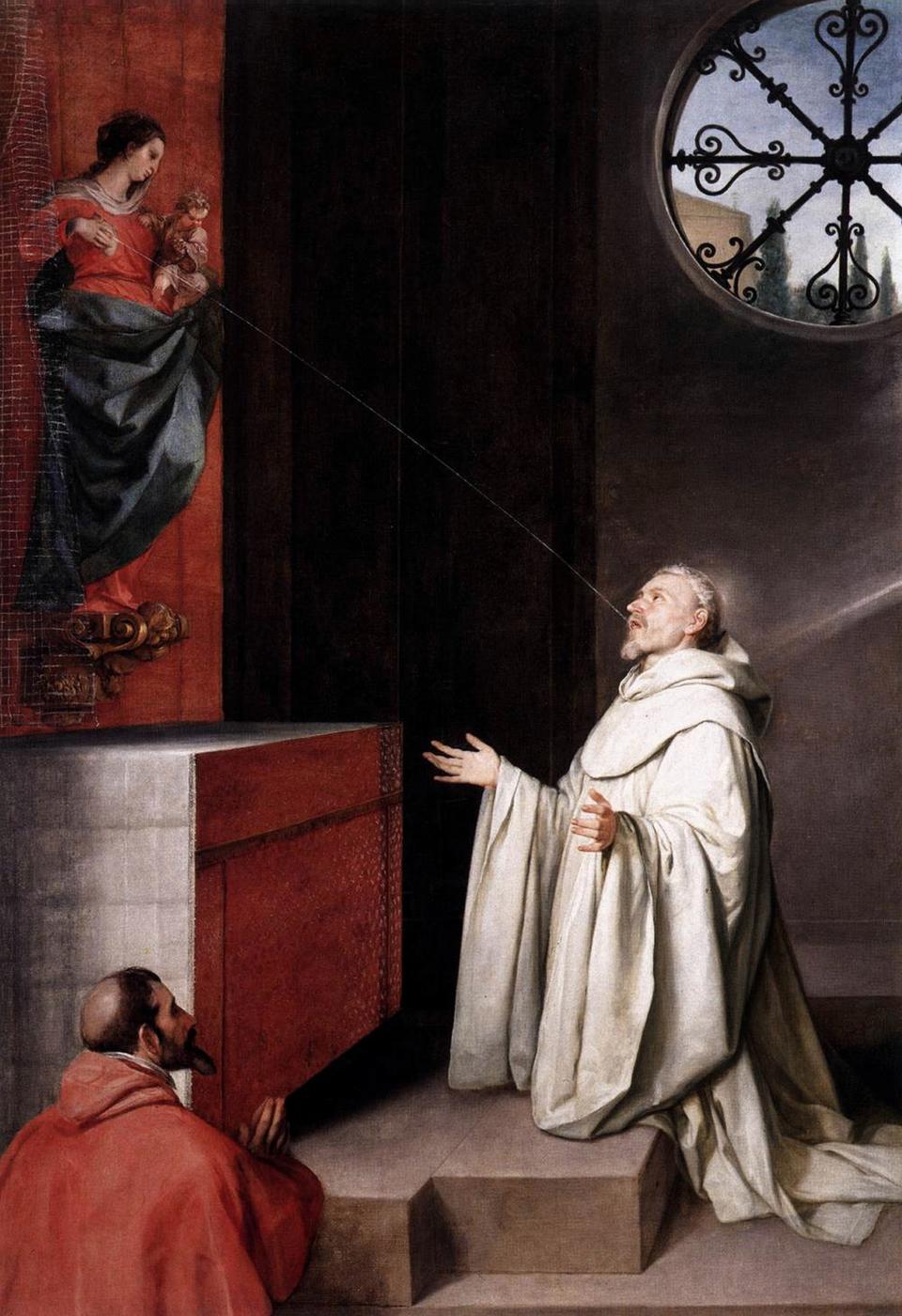All the times Pope Francis has been a breastfeeding cheerleader

While some folks have been known to use religious modesty as an excuse to shame women who choose to breastfeed their babies in public, one spiritual leader has been a strong and consistent supporter of the nurturing practice: Pope Francis.
His latest encouragement to mothers came on Sunday, during an annual baptism ceremony held at the Sistine Chapel in Vatican City. There were 34 babies in attendance, prompting the pope to address moms about the possibility of crying infants. “We will now continue the ceremony; and if they start doing the ‘concert,’ it’s because they’re not comfortable: Either they’re too hot, or they’re not comfortable, or they’re hungry,” Francis said. “If they’re hungry, breastfeed them, without fear, feed them, because that’s a language of love.”
Past papal comments on breastfeeding that have grabbed headlines over the past several years have also been loving and supportive. Consider the following timeline:
In Dec. 2013, eight years after the unfazed-looking pope was photographed kissing a baby at a Mass for newborns, just inches from a mother breastfeeding her infant, he shared the following with Italian newspaper La Stampa: “There are so many children that cry because they are hungry. At the Wednesday General Audience the other day there was a young mother behind one of the barriers with a baby that was just a few months old. The child was crying its eyes out as I came past. The mother was caressing it. I said to her, ‘Madam, I think the child’s hungry.’ ‘Yes, it’s probably time…,’ she replied. ‘Please give it something to eat!’ I said. She was shy and didn’t want to breast-feed in public, while the pope was passing. I wish to say the same to humanity: Give people something to eat! That woman had milk to give to her child; we have enough food in the world to feed everyone.”

At the Jan. 2014 baptism ceremony at the Sistine Chapel, Pope Francis had the following to say to the 30-plus moms in attendance about their babies: “Some will cry because they are uncomfortable or because they are hungry. If they are hungry, mothers, let them eat, no worries, because here, they are the main focus.” That prompted one breastfeeding mother there, Vatican Radio journalist Emer McCarthy, to tell Catholic News Service, “Who would have thought the pope would be this great proponent?”
In 2015, also at the baptism ceremony, the pope had a similar message, saying, “You mothers give your children milk, and even now, if they cry because they are hungry, breastfeed them — don’t worry.”
In 2016, he tweaked the message just a bit, invoking the Virgin Mary: “If your children are crying because they are hungry,” the pope told the moms at the group baptism, “then go ahead and feed them, just as Mary breastfed Jesus.”
So in a day and age when nursing moms are being kicked out of places from malls and gyms to city council chambers and churches, what gives with the pope’s chill attitude?
According to Bucknell University religious studies professor John Penniman, author of Raised on Christian Milk: Food and the Formation of the Soul in Early Christianity, the pope’s statements are notable, not because they’re not in line with Christian thinking, but because, in spite of that, the sentiments are rare.
“This kind of recognition and open affirmation has not been the experience for many mothers in a variety of Christian denominations,” Penniman tells Yahoo Lifestyle. “On the other hand, there is a long history within Christianity of viewing the maternal body as an object of piety and reverence. There is a long artistic and iconographic tradition of depicting scenes of nurturance as moments of profound piety (most famously, perhaps, in The Lactation of St. Bernard, where the saint is struck by milk from a statue of the Virgin Mary while kneeling in prayer). … In Catholicism, this piety toward breastfeeding is amplified by the particular status of Mary, the mother of Jesus.”

Still, he notes, while Catholic leaders can feel well within their religious tenets to articulate positive approaches to breastfeeding, “the result is sometimes that maternity and reproduction are fetishized as the primary way for a woman to live out her faith. So there’s a delicate balance needed here from Christian leaders: How to support and recognize women who are mothers in the church without making motherhood the touchstone of the religion for all Christian women? The Catholic Church — indeed the Christian tradition in general — has not always been good at this.”
Further, Penniman points to Pope Francis’s acknowledged respect for the Franciscan order of the Catholic Church as a reason for his down-to-earth support; although he is Jesuit, he chose his moniker from Francis of Assisi. “For me,” the new pope explained a few days after his election, “he is the man of poverty, the man of peace, the man who loves and protects creation.”
The Franciscan tradition, Penniman notes, “does emphasize creation, bodies, and the natural world as worthy of admiration and respect rather than suspicion and scorn. That is, Franciscans don’t always have the same emphasis on the sinfulness of the body and the world as other religious orders in Christianity might.”
Because of that, he says, “acknowledging and addressing the basic facts of embodied life, simple as it may seem, may be one of the hallmarks of this pope’s public persona.”
Read more from Yahoo Lifestyle:
Follow us on Instagram, Facebook, and Twitter for nonstop inspiration delivered fresh to your feed, every day.
